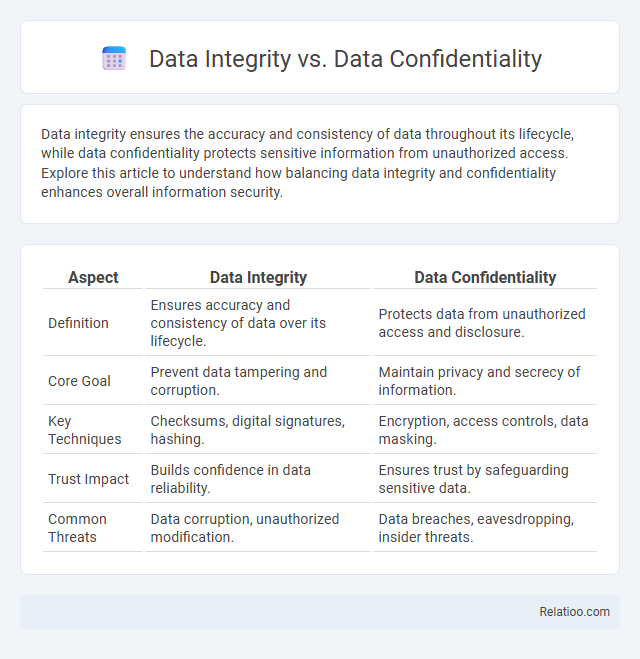Data integrity ensures the accuracy and consistency of data throughout its lifecycle, while data confidentiality protects sensitive information from unauthorized access. Explore this article to understand how balancing data integrity and confidentiality enhances overall information security.
Table of Comparison
| Aspect | Data Integrity | Data Confidentiality |
|---|---|---|
| Definition | Ensures accuracy and consistency of data over its lifecycle. | Protects data from unauthorized access and disclosure. |
| Core Goal | Prevent data tampering and corruption. | Maintain privacy and secrecy of information. |
| Key Techniques | Checksums, digital signatures, hashing. | Encryption, access controls, data masking. |
| Trust Impact | Builds confidence in data reliability. | Ensures trust by safeguarding sensitive data. |
| Common Threats | Data corruption, unauthorized modification. | Data breaches, eavesdropping, insider threats. |
Introduction to Data Integrity and Data Confidentiality
Data integrity ensures the accuracy and consistency of your data throughout its lifecycle, preventing unauthorized alterations or corruptions. Data confidentiality protects sensitive information by restricting access only to authorized users, maintaining privacy and secrecy. Both concepts are foundational to comprehensive data security, which encompasses measures to safeguard your data from breaches, loss, and misuse.
Defining Data Integrity
Data integrity ensures the accuracy and consistency of your data throughout its lifecycle, preventing unauthorized alterations or corruption. Unlike data confidentiality, which restricts access to sensitive information, data integrity safeguards the trustworthiness and reliability of the data itself. Security encompasses both these aspects, implementing measures to protect data from breaches, unauthorized access, and loss.
Understanding Data Confidentiality
Data confidentiality ensures that sensitive information is accessible only to authorized individuals, protecting your data from unauthorized access and breaches. Unlike data integrity, which focuses on the accuracy and consistency of data over its lifecycle, confidentiality safeguards privacy by implementing encryption, access controls, and authentication mechanisms. Security encompasses both confidentiality and integrity, aiming to protect data from threats while maintaining its trustworthiness and availability.
Key Differences Between Data Integrity and Data Confidentiality
Data integrity ensures the accuracy and consistency of your data throughout its lifecycle by preventing unauthorized alterations, while data confidentiality focuses on restricting access to sensitive information to authorized users only. Data integrity protects you from data corruption and unauthorized modifications, often through checksums and validation protocols, whereas data confidentiality employs encryption and access controls to prevent data exposure. Security encompasses both data integrity and confidentiality, as well as availability, to create a comprehensive defense against data breaches and cyber threats.
Importance of Data Integrity in Modern Systems
Data integrity ensures accuracy and consistency of information over its lifecycle, preventing unauthorized alterations that could compromise decision-making and system functionality. While data confidentiality protects sensitive information from unauthorized access and security encompasses a broader set of measures against threats, integrity remains critical for maintaining trustworthiness in financial systems, healthcare records, and cloud computing environments. Modern systems rely on robust integrity protocols like checksums, cryptographic hashes, and blockchain to detect and prevent data corruption or tampering.
Significance of Data Confidentiality in Cybersecurity
Data confidentiality ensures that sensitive information is accessible only to authorized users, preventing unauthorized disclosure and protecting privacy in cybersecurity frameworks. While data integrity guarantees accuracy and data security encompasses overall protection measures, confidentiality specifically guards your data from breaches and leaks. Maintaining data confidentiality is crucial for preserving trust, compliance, and safeguarding your digital assets against cyber threats.
Real-World Threats to Data Integrity and Confidentiality
Data integrity ensures your information remains accurate and unaltered, while data confidentiality focuses on restricting access to authorized users only. Real-world threats to data integrity include unauthorized data modification, malware attacks, and human errors that can corrupt or manipulate data. Data confidentiality faces risks such as phishing, insider threats, and data breaches aimed at exposing sensitive information to unauthorized parties.
Methods to Ensure Data Integrity
Methods to ensure data integrity include checksum algorithms, cryptographic hash functions, and digital signatures, which detect and prevent unauthorized data alterations. Implementing access controls, audit trails, and data validation techniques further protect data accuracy and consistency over its lifecycle. Regular backups and replication also maintain data integrity by providing recovery options in case of corruption or loss.
Strategies for Enhancing Data Confidentiality
Enhancing data confidentiality involves implementing encryption techniques, access controls, and multi-factor authentication to ensure only authorized users access sensitive information. Regular auditing and monitoring help detect unauthorized access attempts and potential data breaches, safeguarding your data from exposure. Employing data masking and secure communication protocols also significantly contributes to maintaining confidentiality in your organization's data security framework.
Balancing Data Integrity and Confidentiality in Organizations
Balancing data integrity and confidentiality is crucial for organizations to maintain accurate, reliable information while protecting sensitive data from unauthorized access. Implementing robust access controls, encryption methods, and regular integrity checks ensures that data remains unaltered and secure throughout its lifecycle. Prioritizing both aspects simultaneously enhances trust, compliance with regulations, and overall cybersecurity posture.

Infographic: Data Integrity vs Data Confidentiality
 relatioo.com
relatioo.com